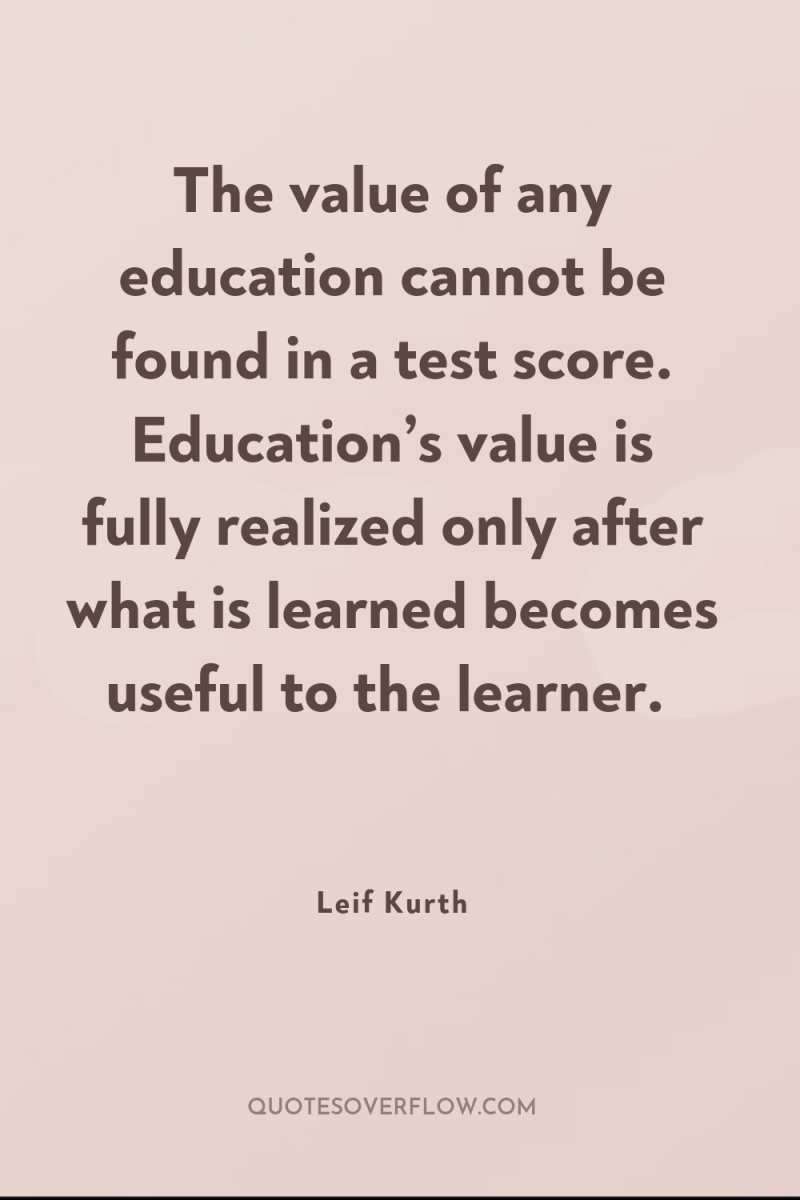
1
The value of any education cannot be found in a test score. Education’s value is fully realized only after what is learned becomes useful to the learner.Leif Kurth
2
When there’s a vacuum of public input, lobbyists usually fill it. But when there’s public input, the people usually win.Morgan Carroll
3
Housing is a human right. There can be no fairness or justice in a society in which some live in homelessness, or in the shadow of that risk, while others cannot even imagine it.Jordan Flaherty
4
Here is my first principle of foreign policy: good government at home.William Ewart Gladstone
5
You don’t want atheism shoved down your throat? OK. We will stock knocking on doors spreading our ‘Truth, ’ and having tax-exempt organizations dedicated to atheism that have influential political action committees. We will also stop printing ‘In atheism we trust’ on all US currency and saying, ‘One nation, under atheism” in the pledge of allegiance. We will also stop insisting that everyone who disagrees with us will be sentence to eternal damnation… Wait….David G. McAfee
6
In recent years a smaller share of young adults has been employed than at any time since the Bureau of Labor Statistics started tracking such trends in 1948. So it's not surprising that this generation of youthful protesters has a different focus for their grievances: the economy, stupid. But notice the targets they've chosen to demonize. It's all about class, not age. It's 1% versus 99%, not young versus old. Occupy Wall Street, not Occupy Leisure World.Pew Research Center
7
Democracy cannot function or survive without a sufficient medium by which citizens remain informed and engaged in public policy debates.Nancy Snow
8
America isn't breaking apart at the seams. The American dream isn't dying. Our new racial and ethnic complexion hasn't triggered massive outbreaks of intolerance. Our generations aren't at each other's throats. They're living more interdependently than at any time in recent memory, because that turns out to be a good coping strategy in hard times. Our nation faces huge challenges, no doubt. So do the rest of the world's aging economic powers. If you had to pick a nation with the right stuff to ride out the coming demographic storm, you'd be crazy not to choose America, warts and all.Pew Research Center
9
In the twenty-first century, the visions of J.C. Nichols and Walt Disney have come full circle and joined. “Neighborhoods” are increasingly “developments, ” corporate theme parks. But corporations aren’t interested in the messy ebb and flow of humanity. They want stability and predictable rates of return. And although racial discrimination is no longer a stated policy for real estate brokers and developers, racial and social homogeneity are still firmly embedded in America’s collective idea of stability; that’s what our new landlords are thinking even if they are not saying it. (138).Tanner Colby
10
Government is a contrivance of human wisdom to provide for human wants, " wrote Edmund Burke in his Reflections on the Revolution in France. In the original and primary sense of lacks or needs, wants tend to structure our vision of government's responsibilities. The quest for security - whether economic, physical, psychological, or military - brings a sense of urgency to politics and is one of the enduring sources of passion in policy controversies. Need is probably the most fundamental political claim. Even toddlers know that need carries more weight than desire or deservingness. They learn early to counter a rejected request by pleading, "I need it." To claim need is to claim that one should be given the resources or help because they are essential. Of course, this raises the question "essential for what?" In conflicts over security, the central issues are what kind of security government should attempt to provide; what kinds of needs it should attempt to meet; and how the burdens of making security a collective responsibility should be distributed. Just as most people are all for equity and efficiency in the abstract, most people believe that society should help individuals and families when they are in dire need. But beneath this consensus is a turbulent and intense conflict over how to distinguish need from mere desire, and how to preserve a work - or - merit based system of economic distribution in the face of distribution according to need. Defining need for purposes of public programs become much an exercise like defining equity and efficiency. People try to portray their needs as being objective, and policymakers seek to portray their program criteria as objective, in order to put programs beyond political dispute. As with equity and efficiency, there are certain recurring strategies of argument that can be used to expand or contract a needs claim. In defense policy, relative need is far more important than absolute. Our sense of national security (and hence our need for weapons) depends entirely on comparison with the countries we perceive as enemies. And here Keynes is probably right: The need for weapons can only be satisfied by feeling superior to "them." Thus, it doesn't matter how many people our warheads can kill or how many cities they can destroy. What matters is what retaliatory capacity we have left after an attack by the other side, or whether our capacity to sustain an offense is greater than their capacity to destroy it. The paradox of nuclear weapons is that the more security we gain in terms of absolute capability (i.e., kill potential), the more insecure we make ourselves with respect to the consequences of nuclear explosions. We gain superiority only by producing weapons we ourselves are terrified to use.Deborah Stone